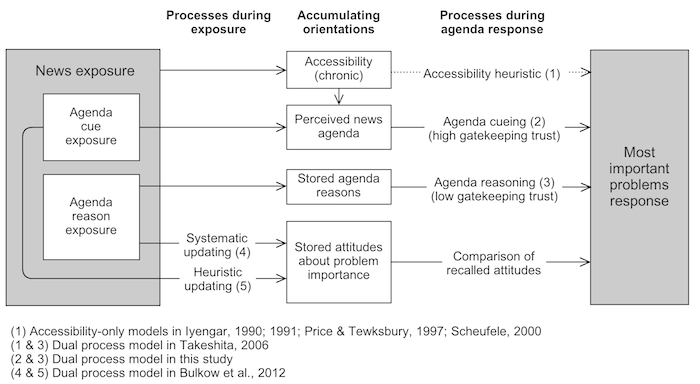2013 members of PCRG, a collaborative research group I started in my first year at LSU.
Research
Social media and news
Increasingly often, people encounter news via social media links to news stories from sources they wouldn't have sought out directly, with accompanying commentary from friends that may serve to frame the article before reading it. My research has found that this prior framing can affect how much people learn from subsequently reading a news story. In another study, we found that a friend linking to a story from a particular source can affect trust in that source and willingness to seek information from it in the future (either positively or negatively, depending on trust in the friend).
Online news portal field experiments
My recent research has focused on developing a new method and software for field experiments using a custom news portal. This is a new way of studying effects of online news use, in which we are able to study whether effects of certain types of news accumulate over time by randomly assigning a certain amount of that type of news within a news portal that study participants are asked to use as their main news source for a week. The software I developed for these experiments automatically captures news stories from Google News, can automatically assign them to be categorized by human workers using the Amazon Mechanical Turk API, and then delivers them as timely news stories to study participants. Together with PCRG, my collaborative research group, I have conducted three of these experiments since 2016, resulting in one paper in press and three others under review. I look forward to many follow up studies using this same software to address different questions about accumulating effects of online news use.
Agenda cueing and reasoning
Media agenda setting includes two very different kinds of effects: agenda reasoning, which is the influence of good reasons for issue importance learned from news coverage, and agenda cueing, which is the influence of the mere fact of news coverage of an issue regardless of its content. We found that agenda cueing depends on a naive form of media trust called gatekeeping trust, in which people believe that news workers are choosing what to cover based on how important they think underlying social problems are, instead of the "news values" (conflict, drama, novelty, etc) that research has shown strongly influences which events are covered. Two experiments on this were published in Journal of Communication, here and here. Three additional experiments pending publication have found that agenda cueing effects are not unique to traditional news, and can also occur when the cue comes from social media (specifically Twitter) or from public opinion polls.
The following figure (from the second study) illustrates the difference between our dual process model during the moment of agenda response and other dual process models of agenda setting, including an on-line model during each moment of news reception.

Effects of passive journalism
Overly passive, "he said / she said" news coverage can make audiences lose confidence in the knowability of political facts, which may in turn lead some to tune out of politics and others to tune in in ways that disregard truth. See this piece in Journal of Communication, or read media coverage of it in The American Prospect, Science Daily, Grist, Discover Magazine, and Media Digest. Also see the follow-up study in Communication Research showing these effects are different from framing effects on political cynicism. A third study (from data actually collected first) is currently under review.
Game framing effects on citizen reasoning
Even a brief exposure to game-framed post-debate coverage can make audience members less likely to even try to reason about the substantive policy questions discussed in the debate itself. See this study in Journal of Communication, read news coverage of it in Science Daily, UPI or The Washington Post's WonkBlog, or listen to the NPR interview below.
Expression effects
Messages affect their senders, not just their receivers. See this paper in Communication Theory for my alternative message effects model including several kinds of effects on senders. A 2014 book chapter applies this model to new media to help explain the mechanisms behind the mobilizing power of social media.